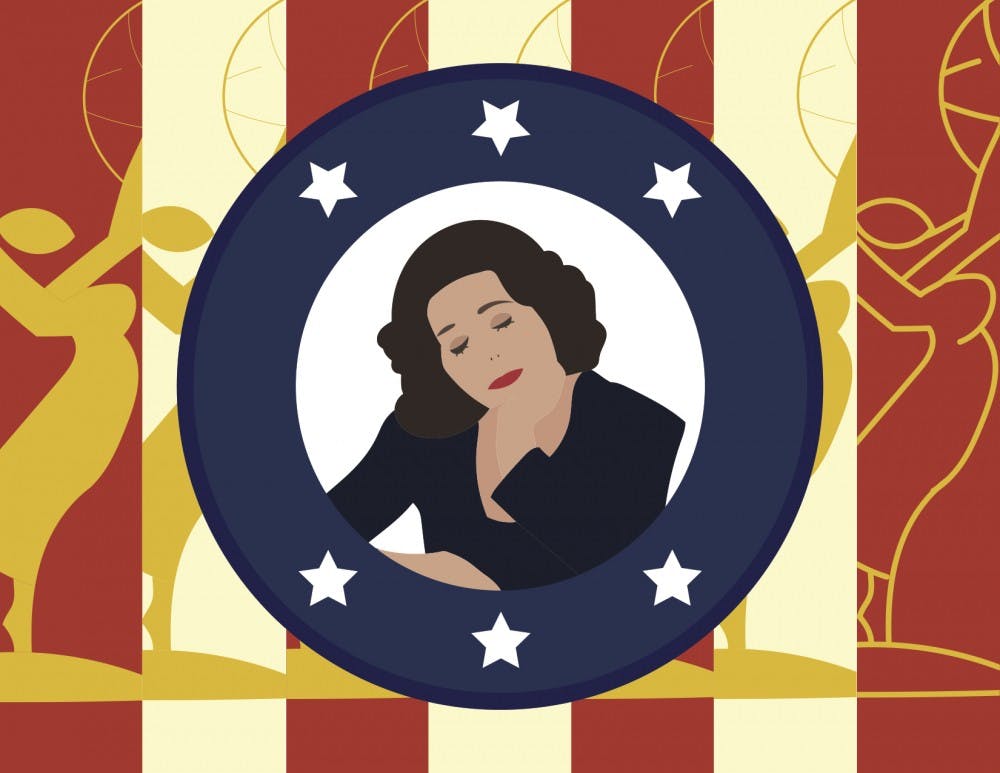I spent many middle school evenings sitting at my kitchen table half doing homework, half watching whatever my mom had on TV.
One day, seemingly unprompted, mom stopped in the middle of washing a dish and pointed a soapy yellow-gloved finger to the TV, which was playing a re-run of “Seinfeld.”
“If you want a funny woman to watch, you should watch Julia Louis-Dreyfus,” she said. “She’s brilliant. And she’s got awesome curly hair.”
My mom — God, love her — had noticed I had sparked an interest in comedy, and eagerly stoked that flame by pointing out funny women I could look up to.
Elaine Benes is a knockout character. She’s confident and nervous. She’s messy and in charge. She’s goofy and sexy. She’s bold, sharp as hell and dances with no rhyme or reason. And, Louis-Dreyfus brings all of this to the screen with a cool-girl grace.
Watching Elaine on screen felt like watching an old friend. Natural, and comfortably hilarious.
And I — a nervous middle-schooler who didn’t possess an ounce of cool, hated her own curly hair and was a horrible dancer — adored her instantly. It must have been a mother’s intuition.
Last Sunday, ten years after my mom introduced me to Elaine, I anxiously watched the Emmys to see if Louis-Dreyfus would win Best Lead Actress in a Comedy Series for her role as Selina Meyer on HBO’s “VEEP.”
Winning would have made her the most awarded actor, male or female, in Emmy history.
She lost, and I was genuinely sad.
When I started watching “VEEP” in high school, I fell in love with Louis-Dreyfus all over again. Selina is a lethal force of a woman. She’s nasty, cutthroat and everything wrong with American politics. And she does it all in a killer pair of pumps.
What’s truly special about Louis-Dreyfus’ performance is how she brings nuance to someone so outrageously performative.
Enjoy what you're reading?
Signup for our newsletter
Occasionally, Louis-Dreyfus cracks open Selina’s shell and gives a glimpse at how her political career has wrecked and consumed her. In these moments, Louis-Dreyfus gives Selina the depth and authenticity that allows her to be understood as a human rather than a monster. It’s just enough to leave you misty-eyed, to keep rooting for her.
And just when you’ve let your guard down, Louis-Dreyfus delivers one of the show’s famous one-liners with intense precision. It hits like a gut punch, and makes you blush and burst out laughing.
In January 2018, I attended a Q&A with Miami alum Rick Ludwin, former vice president of late-night and prime-time programming at NBC. When we asked him about “Seinfeld’s” origins, he recalled how Louis-Dreyfus was their missing piece, “the magic” that brought it all together.
I was thankful to be seated toward the back of the room, because I started to cry.
I cried because both on and off screen, Louis-Dreyfus is an example of the magic that comes from a woman who pushes boundaries and raises her voice.
In her 2017 Screen Actors Guild Awards speech she spoke out against the immigration ban, discussing how her father fled persecution in Nazi-occupied France and came to the U.S.
In 2017, the day after she won a record-breaking sixth consecutive Emmy for her role on “VEEP,” she was diagnosed with breast cancer.
In her public announcement, she commented on how fortunate she was to have insurance to cover her medical expenses and called for making, “universal health care a reality” so that anyone could afford the required treatments.
She beat cancer. She won the Mark Twain Prize for Comedy. She’s a total badass.
While she did not win at Sunday’s Emmys, she and Cloris Leachman still share the title of most Emmy awarded actor of all time.
After she lost, she presented the award for Best Supporting Actress in a Limited Series or Movie. She allowed the line between her character and herself to blur, complaining about having to share the stage with co-stars and telling her right-hand man to “just drop it” when he suggested that maybe she’d win for this category.
Through her career, Louis-Dreyfus has demonstrated that, no matter how imperfect or bizarre or crass, there is humor in being human. Her funny is never forced; instead, it springs naturally from the character she builds with careful patience, making the silly or down-right outrageous moments all the more delicious.
She’s a woman who leads with grace and eloquence, and plays to the top of her intelligence. She has shown us the importance of humility. She’s funny as hell.
Julia Louis-Dreyfus’ impact on comedy has been profound. Magical, even.
And she’s not done yet.




